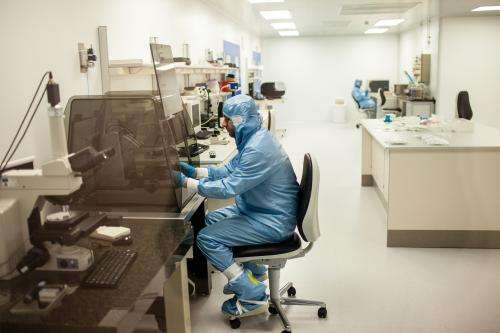Lab-on-a-chip to detect spread of pancreatic cancer in five hours

(Medical Xpress)—90% of cancer deaths are caused by metastasis. This occurs when a tumor sheds circulating tumor cells (CTC), which can invade new areas of the body. The process for detecting these cells is currently long, complex and expensive.
However, the European authorities believe it could be reduced as regards cost, time and human resources by using existing microfluidics technologies, and the CANDO project has been set up as a result. It will involve the work of the Basque technology centre IK4-IKERLAN and will consist of developing a lab-on-a-chip device to automatically identify and measure the concentration of CTCs.
This system will be used to predict, classify and monitor pancreatic cancer status, and early estimates suggest diagnosis will be available in just 5 hours. Detecting the cancer's progression will help assess individual response to oncological therapies (i.e. confirm whether the treatment is working or not), helping improve patients' quality of life.
Pancreatic cancer has a major socio-economic impact, as it is generally detected at a very advanced stage, with 96% mortality probabilities, in around 68,000 Europeans every year.
The laboratory procedures for detecting CTCs are difficult, time-consuming and expensive, as they are complicated by the low number of these cells in the bloodstream (around 1:1000000000). The analysis is conducted by a team of people and takes several days, involving manual sample extraction, identification and enumeration of the cells under the microscope and biological and molecular characterisation of the CTCs.
Apart from automation of the process, reducing its cost and speeding up cancer diagnosis, there is also a second aspect to the CANDO project: progress in 'targeted therapies', a type of treatment whose effects specifically focus on cancer cells, causing very little damage to normal cells.
The advances achieved by the CANDO project will not only be used to predict, classify and monitor the status of pancreatic cancer but also to develop new, less invasive drugs to treat it.
How it works
The diagnosis procedure will consist of firstly taking a blood sample from the patient and placing it on a chip with micro-nano-bio and photonic systems able to amplify DNA and perform molecular analysis. The chip is then placed in the system created by IK4-IKERLAN for identifying and counting the CTCs. Five hours later the diagnosis is ready.
Although there is no date planned as yet for marketing the system, the CANDO project already has its own exploitation committee to guarantee its market introduction.
A marketing plan will be developed, mainly for Europe and the US. One of the first stages of the plan will include publicising the system at oncologists' meetings held by the European Society for Medical Oncology and at the European and American clinical oncology associations.















